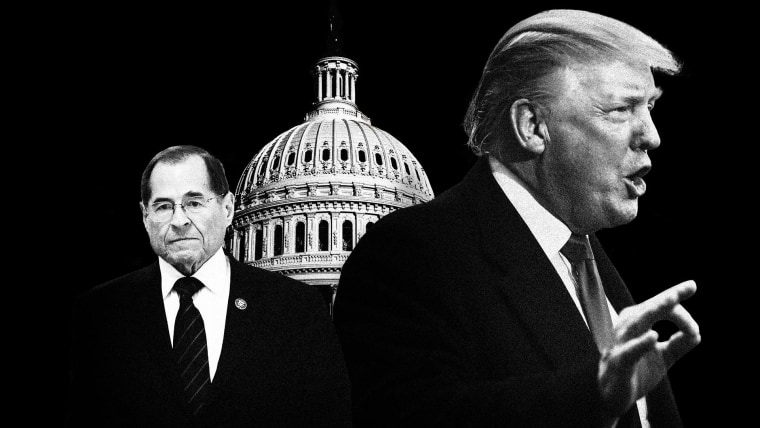It took a little longer than expected, but the House Judiciary Committee convened this morning and voted along party lines to approve two articles of impeachment against Donald Trump, formally accusing him of both abusing his power and obstructing Congress.
Both measures will be voted on by the full House ... and come after weeks of damaging testimony against Trump.The votes follow 14 hours on Thursday debating the articles and amendments offered by Republicans that sought to gut resolutions. There was no further discussion of the impeachment articles on Friday morning before the two quick historic roll call votes lasting only a few minutes.
The vote on each article of impeachment, as expected, was 23 to 17. (Note, there are 24 Democrats on the Judiciary Committee, but Democratic Rep. Ted Lieu of California underwent surgery this week and was unavailable for this morning's votes. By all appearances, Lieu supports the impeachment effort and would've voted with the majority had he been able to attend.)
These were the first Judiciary Committee votes on presidential impeachment since 1998, when the GOP-led panel voted nearly along party lines on four articles targeting Bill Clinton. In those votes, there was partisan unanimity on three of the four, but on one of the articles -- the one in which the then-president was accused of perjury in the Paula Jones civil suit -- a brave GOP lawmaker broke ranks and sided with Democrats.
His name was Lindsey Graham of South Carolina. His career has since taken an unfortunate turn.
Nevertheless, this morning's developments set the stage for only the third House floor votes on presidential impeachment in American history. Those votes are expected next week, possibly as early as Wednesday.
The articles are expected to pass, impeaching Trump, and initiating a Senate trial -- which Senate Majority Leader Mitch McConnell (R-Ky.) has already promised to steer in the president's favor.
Before moving on, it's also worth pausing to note why the Judiciary Committee's vote was this morning, instead of last night.
The committee markup phase, in which members debate and consider changes to proposals ahead of a final vote, began relatively early yesterday morning, and continued for roughly 14 hours. As midnight approached last night, Judiciary Committee Chairman Jerry Nadler (D-N.Y.) announced that members deserved a chance to reflect before casting a vote, which led him to delay the proceedings until this morning.
Republicans, to put it mildly, were furious and there are different schools of thought as to why. The official GOP line was that they weren't consulted in an advance about the delay.
But there are alternative explanations. Some have suggested, for example, that Republicans wanted the vote to occur in the middle of the night so that fewer Americans would be aware of it. Others have made the case that Republicans deliberately dragged out yesterday's proceedings in the hopes of creating a late-night vote, so that they'd be able to argue that Democrats voted to impeach the president in the middle of the night.
It's also possible, of course, that members, who generally don't work on Fridays, didn't appreciate the interruption of what they expected to be a three-day weekend.
